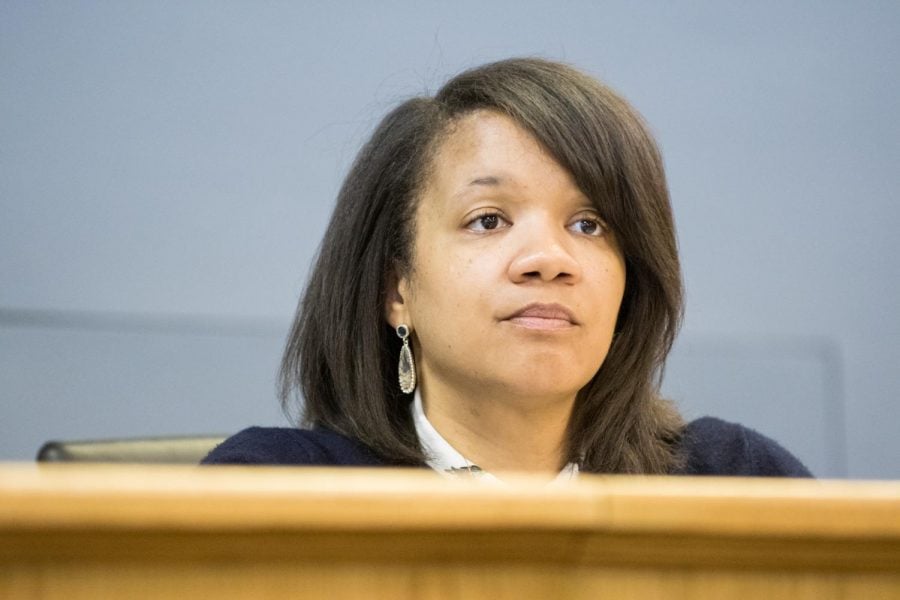Ald. Robin Rue Simmons, writer John Tateishi discuss reparations, redress
Daily file photo by Colin Boyle
Ald. Robin Rue Simmons (5th) at a City Council meeting in 2018. Rue Simmons discussed Black reparations and Japanese American redress with writer John Tateishi in a virtual Day of Remembrance event Sunday.
February 22, 2021
Ald. Robin Rue Simmons (5th) and writer John Tateishi discussed Black reparations and Japanese American redress in a virtual annual Day of Remembrance event Sunday.
The event, hosted by the Japanese American Citizens League Chicago, commemorated a 1942 executive order that forced Japanese Americans out of their homes and into internment camps during World War II. Over a sixth of the former internees eventually moved to Chicago to rebuild their lives.
The program included a statement from Chicago Mayor Lori Lightfoot, footage of Japanese Americans’ 1981 testimonies about their experiences, a reading of the Japanese American exclusion order and a discussion featuring Rue Simmons and Tateishi. Josina Morita, commissioner of the Metropolitan Water Reclamation District, moderated the event.
Tateishi, who was recently appointed chair of the JACL National Committee for Redress, launched the redress campaign in 1978 to educate Americans about the mass incarceration of Japanese Americans in World War II and create the Commission on Wartime Relocation and Internment of Civilians.
He said the commission sought to determine the “factual history” of why the mass incarceration occurred and give Nisei, or second-generation Japanese Americans, an opportunity to talk about their experiences.
“The Nisei had been so damaged that they couldn’t talk about what we call ‘camp,’ couldn’t talk about the experience and couldn’t articulate their own pain, and as a result, turned to silence,” Tateichi said. “We built this wall around us, which contributed in part to the public not knowing anything about it.”
Tateichi said Japanese Americans’ need to share their experiences was only revealed when the commission started announcing its hearing schedules. He said Japanese Americans were “fighting to get on that list to be able to testify.”
As a result of the hearings, Congress established a fund to grant wartime survivors individual reparations of $20,000 and former President Ronald Reagan signed a formal letter of apology to surviving victims on behalf of the nation, the latter of which Tateichi said was the most meaningful. Tateichi also said the testimonies “gave voice to the Nisei” and “began to heal us as a community and ultimately as a nation.”
Morita added that the testimonies also sparked conversations outside of the courtroom.
“There was a breaking of silence — once people started to testify, that became much more widespread in the community, even for those who didn’t go to the hearings,” Morita said. “People like my grandmother started telling their stories.”
Rue Simmons, who led the effort to pass the nation’s first Black reparations program as chair of Evanston’s reparations subcommittee, echoed Tateichi’s sentiment about the importance of sharing personal experiences with injustice to open up a national conversation.
She also encouraged Asian Americans to continue to stand in solidarity with the Black community as “two independent communities that have been harmed by the United States government.” She urged those who want to support the fight for Black reparations to focus on educating those around them.
She said while she is grateful for Evanston’s reparations program, which is funded by tax revenue collected from sales of recreational cannabis as well as contributions from businesses and residents, it is “not nearly enough” for Black community members to get the justice, equality and empowerment they deserve.
“It’s going to take a reparative action at every level of government, at our major institutions, through family foundations — it’s going to take all of us working together to address the crimes against humanity in the Black community,” Rue Simmons said.
Email: waverlylong@u.northwestern.edu
Twitter: @waverly_long
Related Stories:
— Ald. Rue Simmons speaks at national reparations forum following Congressional hearing on H.R. 40



